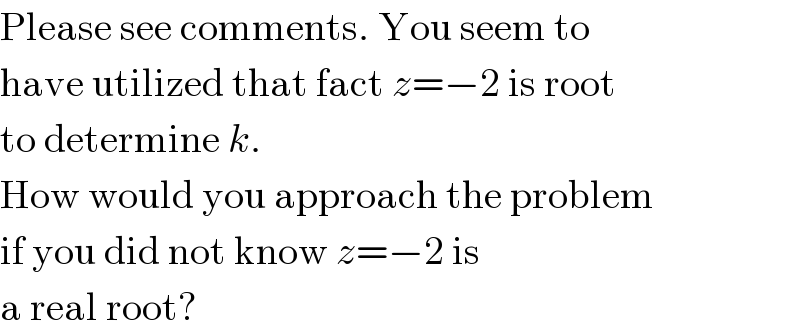Question Number 96407 by Enyz last updated on 01/Jun/20

Commented by prakash jain last updated on 01/Jun/20

$${z}^{\mathrm{3}} +\mathrm{2}{z}^{\mathrm{2}} +\left({k}−\mathrm{8}\sqrt{\mathrm{2}}{i}\right){z}+\left(\mathrm{8}−\mathrm{4}{k}\sqrt{\mathrm{2}}{i}\right)=\mathrm{0} \\ $$$$\mathrm{Let}\:{z}={x}\:\mathrm{be}\:\mathrm{real}\:\mathrm{root} \\ $$$${x}^{\mathrm{3}} +\mathrm{2}{x}^{\mathrm{2}} +{kx}−\mathrm{8}{ix}\sqrt{\mathrm{2}}+\mathrm{8}−\mathrm{4}{k}\sqrt{\mathrm{2}}{i}=\mathrm{0}\:\left(\mathrm{i}\right) \\ $$$${x}\:\mathrm{is}\:\mathrm{real} \\ $$$$\mathrm{Imaginary}\:\mathrm{part}=\mathrm{0} \\ $$$$−\mathrm{8}{x}\sqrt{\mathrm{2}}+\mathrm{4}{k}\sqrt{\mathrm{2}}=\mathrm{0} \\ $$$${x}=−\frac{{k}}{\mathrm{2}} \\ $$$$\mathrm{real}\:\mathrm{part} \\ $$$${x}^{\mathrm{3}} +\mathrm{2}{x}^{\mathrm{2}} +{kx}+\mathrm{8}=\mathrm{0} \\ $$$$\mathrm{put}\:{x}=−\frac{{k}}{\mathrm{2}} \\ $$$$−{k}^{\mathrm{3}} +\mathrm{4}{k}^{\mathrm{2}} −{k}^{\mathrm{2}} +\mathrm{16}=\mathrm{0} \\ $$$${k}^{\mathrm{3}} −\mathrm{3}{k}^{\mathrm{2}} −\mathrm{16}=\mathrm{0} \\ $$$${k}^{\mathrm{3}} −\mathrm{4}{k}^{\mathrm{2}} +{k}^{\mathrm{2}} −\mathrm{16}=\mathrm{0} \\ $$$${k}^{\mathrm{2}} \left({k}−\mathrm{4}\right)+\left({k}−\mathrm{4}\right)\left({k}+\mathrm{4}\right)=\mathrm{0} \\ $$$$\left({k}^{\mathrm{2}} +{k}+\mathrm{4}\right)\left({k}−\mathrm{4}\right)=\mathrm{0} \\ $$$$\mathrm{only}\:\mathrm{real}\:\mathrm{value}\:{k}=\mathrm{4}\:\mathrm{satisfies}. \\ $$$$\Rightarrow{k}=\mathrm{4} \\ $$$${k}=\mathrm{4}\:\mathrm{in}\:\mathrm{original}\:\mathrm{equation} \\ $$$${z}^{\mathrm{3}} +\mathrm{2}{z}^{\mathrm{2}} +\left(\mathrm{4}−\mathrm{8}\sqrt{\mathrm{2}}{i}\right){z}+\left(\mathrm{8}−\mathrm{16}\sqrt{\mathrm{2}}{i}\right)=\mathrm{0} \\ $$$${z}^{\mathrm{2}} \left({z}+\mathrm{2}\right)+\left(\mathrm{4}−\mathrm{8}{i}\sqrt{\mathrm{2}}\right)\left({z}+\mathrm{2}\right)=\mathrm{0} \\ $$$$\left({z}+\mathrm{2}\right)\left({z}^{\mathrm{2}} +\mathrm{4}−\mathrm{8}{i}\sqrt{\mathrm{2}}\right)=\mathrm{0} \\ $$$${z}=−\mathrm{2}\:\mathrm{already}\:\mathrm{considered} \\ $$$$\mathrm{other}\:\mathrm{two}\:\mathrm{roots} \\ $$$${z}^{\mathrm{2}} =−\mathrm{4}+\mathrm{8}{i}\sqrt{\mathrm{2}} \\ $$$${z}=\pm\sqrt{−\mathrm{4}+\mathrm{8}{i}\sqrt{\mathrm{2}}} \\ $$$${z}=\pm\mathrm{2}\sqrt{−\mathrm{1}+\mathrm{2}{i}\sqrt{\mathrm{2}}} \\ $$
Commented by Enyz last updated on 01/Jun/20
Thanks a lot Mr Prakash. But when I substitute the complex roots into the orginal equation with k=4, it doesnt come to 0. Can you spot my mistake?
Commented by peter frank last updated on 01/Jun/20

$$\mathrm{thank}\:\mathrm{you} \\ $$
Commented by peter frank last updated on 01/Jun/20

$$\mathrm{thank}\:\mathrm{you} \\ $$
Answered by Enyz last updated on 01/Jun/20

Commented by Enyz last updated on 01/Jun/20
Could someone check whether this answer Is CORRECT?
Commented by prakash jain last updated on 01/Jun/20

$$\mathrm{Please}\:\mathrm{see}\:\mathrm{comments}.\:\mathrm{You}\:\mathrm{seem}\:\mathrm{to} \\ $$$$\mathrm{have}\:\mathrm{utilized}\:\mathrm{that}\:\mathrm{fact}\:{z}=−\mathrm{2}\:\mathrm{is}\:\mathrm{root} \\ $$$$\mathrm{to}\:\mathrm{determine}\:{k}. \\ $$$$\mathrm{How}\:\mathrm{would}\:\mathrm{you}\:\mathrm{approach}\:\mathrm{the}\:\mathrm{problem} \\ $$$$\mathrm{if}\:\mathrm{you}\:\mathrm{did}\:\mathrm{not}\:\mathrm{know}\:{z}=−\mathrm{2}\:\mathrm{is} \\ $$$$\mathrm{a}\:\mathrm{real}\:\mathrm{root}? \\ $$
Commented by prakash jain last updated on 01/Jun/20

$$\left({a}+{bi}\right)\:\mathrm{and}\:\mathrm{you}\:\mathrm{are}\:\mathrm{assuming}\:{a}\:\mathrm{is} \\ $$$$\mathrm{real}\:\mathrm{and}\:\mathrm{solving}\:\mathrm{for}\:\mathrm{complex}\:\mathrm{value} \\ $$$$\mathrm{that}\:\mathrm{is}\:\mathrm{not}\:\mathrm{correct}. \\ $$$$\mathrm{After}\:\mathrm{factoring}\:\left({z}+\mathrm{2}\right)\:\mathrm{just}\:\mathrm{use} \\ $$$$\mathrm{quadratic}\:\mathrm{formula}. \\ $$
Commented by Enyz last updated on 01/Jun/20
since the equation has one real root, the other two roots are complex conjugates. But my final answer does not fit into the original eqn with k=4
Commented by Enyz last updated on 01/Jun/20
Wondering what went wrong..
Commented by Enyz last updated on 01/Jun/20
Glad if u could help me get the other 2 roots.
Commented by prakash jain last updated on 01/Jun/20

$$\mathrm{while}\:\mathrm{assumin}\:{a}+{ib}={z} \\ $$$${a}\:\mathrm{and}\:{b}\:\mathrm{both}\:\mathrm{are}\:\mathrm{real} \\ $$$${a}=\mathrm{2}{i}\:\mathrm{is}\:\mathrm{not}\:\mathrm{a}\:\mathrm{valid}\:\mathrm{solution}. \\ $$$$\mathrm{Hence}\:\mathrm{you}\:\mathrm{are}\:\mathrm{getting}\:\mathrm{incorrect}\:\mathrm{annswer}. \\ $$
Commented by prakash jain last updated on 01/Jun/20

Commented by prakash jain last updated on 01/Jun/20

$$\mathrm{Please}\:\mathrm{note}: \\ $$$$\mathrm{A}\:\mathrm{quadratic}\:\mathrm{equation}\:\mathrm{has}\:\mathrm{2}\: \\ $$$$\mathrm{complex}\:\mathrm{conjugate}\:\mathrm{roots}.\:\mathrm{This} \\ $$$$\mathrm{is}\:\mathrm{ONLY}\:\mathrm{true}\:\mathrm{if}\:\mathrm{coefficients}\:\mathrm{are} \\ $$$$\mathrm{REAL}. \\ $$$$\left({z}+{i}\right)\left({z}−\mathrm{2}+\mathrm{3}{i}\right)=\mathrm{0} \\ $$$$\mathrm{The}\:\mathrm{above}\:\mathrm{equation}\:\mathrm{has} \\ $$$$\mathrm{2}\:\mathrm{complex}\:\mathrm{roots}\:\mathrm{which}\:\mathrm{are}\:\mathrm{not} \\ $$$$\mathrm{conjugates}. \\ $$
